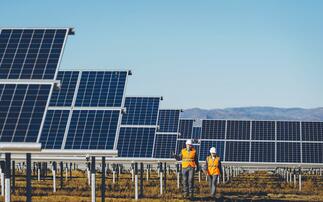Juliet Davenport warns government plans to halt Renewables Obligation next year will cause an investment hiatus
Independent renewable energy supplier Good Energy has warned that up to 70 per cent of its project pipeline is under threat from government plans to halt subsidies for large solar farms, putting around £1.5m of investment at risk.
Juliet Davenport, founder and chief executive of Good Energy, said the changes would create a hiatus in investment across the industry for the next two to three years, in which only the biggest players would be able to survive.
A government consultation will close next week that seeks to end Renewable Obligation (RO) support for ground mounted solar schemes larger than 5MW in capacity from 1 April 2015. The government reasons it needs to put the brakes on the rapid expansion of solar power, which is gobbling up the budget.
Davenport told reporters yesterday that the changes would hit six solar farms it is currently developing, which represent about 60 to 70 per cent of its 110MW project pipeline. Like others in the industry, she is now trying to secure funding for those planned schemes in the hope of completing them before the 31 March 2015 deadline.
According to analysis by NPD Solarbuzz, there are 215 solar farms in the pipeline in a similar position across the industry, only a handful of which are already being built.
With the threat of subsidy cuts looming large, Davenport said it was becoming harder to secure funding. Potential investors are demanding the projects are completed six months earlier than March 2015 to allow for any technical delays that may occur during construction. "Because the subsidies are just disappearing, the funders are very nervous about these projects being built out in time," she said. "Essentially, there's a cliff... It means that any project that's not going to be built by November will not get built."
The government has said it still expects to see some of these projects completed because the RO will remain open for developers that had already made "significant commitments" or had already secured a preliminary RO agreement by 13 May 2014, when the consultation was unveiled.
But Davenport said the criteria for "significant commitments" was too stringent for all but the most advanced schemes. None of Good Energy's six solar schemes would qualify and as a result the company risks losing up to £250,000 on each project that is taken to the planning stage, she said.
For example, the government demands that a project must have already secured a lease from the landowner to qualify, but she said developers only convert their "option for lease" to a lease the day before building starts.
"Nobody would exercise a lease in advance of building a site, but you would have spent all the money to get a lease already. The only difference is if you're exercising that lease or not. For us, that's a technical point that we should push back on."
She also argued that the qualification date should be pushed back to the date the government confirms the changes, in order to give more flexibility to projects which submitted planning applications in May. "If you've put a planning application in, the money has been spent already, so we should be given a chance for those planning apps that went in in May to come out of planning."
By blocking solar farms from the RO, the solar industry will be forced to switch to the new Contract for Difference regime, through which developers will compete for government contracts on price. Like others in the industry, Davenport fears that smaller players will be squeezed out of the auctioning process by larger players who have more insight and lobbying powers.
For that reason, Good Energy is calling on the government to host a separate auction for schemes that are smaller than 50MW in size, and wants the government to ring-fence a proportion of the £7.5bn Levy Control Framework for solar plants.
"It is the consumer who will pay for this. So if anything, we should be looking at this from a holistic point of view and asking how much of this budget will be going to the cheaper technologies and making sure they can become the cheapest technologies going forward."
Her comments come just days after a report by the National Audit Office warned the government that it may have been too generous in awarding billions of pounds worth of early CfDs to offshore wind farms and biomass schemes.
As a result, the government has already used up 58 per cent of the Levy Control Framework that is supposed to last from 2015 until 2021.
Some in the solar industry believe that the government is now using solar subsidy cuts to rebalance its books.








